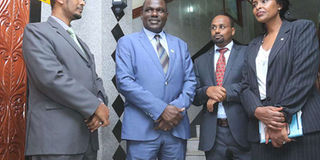IEBC should consider seeking more time to conduct credible poll

From left: IEBC commissioner Yakub Guliye, Chairman Wafula Chebukati, commissioner Boya Molu, and vice chair Consolata Nkatha Bucha Maina when they appeared before select committees of both Senate and National Assembly on the elections law amendments proceedings at Nairobi County Hall on October 5, 2017.PHOTO | JEFF ANGOTE | NATION MEDIA GROUP
What you need to know:
First, Akombe underscored the level of political polarisation that has come to divide the country, a reality that was only further evidenced by public responses to her resignation
Akombe highlighted how political polarisation has exacerbated internal divisions within IEBC.
On Tuesday, Dr Roselyn Akombe resigned as a commissioner of the Independent Electoral and Boundaries Commission (IEBC) stating that: “The commission has become a party to the current crisis” and could “not guarantee a credible election on October 26”.
In response, the IEBC Chairman, Mr Wafula Chebukati, cast further doubt on the process by stating that he “can’t move forward with a divided commission … (or) when presidential candidates refuse to put their personal interests aside”. Akombe’s letter of resignation — together with the various interviews that she and others have since made — raise many issues, only some of which can be discussed here.
First, Akombe underscored the level of political polarisation that has come to divide the country, a reality that was only further evidenced by public responses to her resignation – from allegations that she is a ‘Nasa mole’ to declarations that she is a national heroine. More importantly, this polarisation is reflected in Jubilee and Nasa’s rejection of political dialogue in favour of national prayers and further protest, respectively; and by the suggestion by some of their supporters that they are willing to resort to violence if need be.
POLARISATION
Akombe also highlighted how political polarisation has exacerbated internal divisions within the commission. Her statements also provide further evidence of the same — from her fairly positive comments about Chebukati to strong criticism of the CEO, Mr Ezra Chiloba. Such infighting is critical as it further undermines the commission’s preparations by feeding into a reinforcing mix of questionable decisions, poor communication and a crisis of public confidence.
We then have the problems witnessed during the transmission and tallying of votes in August. In short, the Supreme Court annulled the presidential election of August 8 because the majority of judges concluded that the IEBC had failed to conduct the election in accordance with the Constitution and relevant laws.
Problems included a failure to transmit presidential results (or Forms 34A) from polling stations; to provide all forms 34As as a means to verify constituency level results (Forms 34B); to explain a large number of anomalies (including the lack of security features on some Forms 34B); and to comply with the court’s ruling to provide access to the commission’s server and access logs.
UNCERTAINTY
The IEBC also has less time to prepare and has faced much uncertainty about who will vie. Taken together, these issues — of political polarisation and uncertainty, internal wrangling, previous shortcomings and security concerns (discussed below) — all raise serious doubts about whether, if an election is held next Thursday, the process can be any better in procedural terms. The danger is that it will be worse, which raises the possibility that the Supreme Court will annul the election once again.
This is then compounded by the fact that elections are not simply technocratic processes. In turn, Nasa’s demand that no elections be held without electoral reform, and Raila Odinga’s decision not to vie, call the legitimacy of the entire process into question.
This then links to another problem: Whether IEBC staff will actually be able to conduct elections across the country. As Akombe noted, most field staff are committed to doing “the right thing”, but many are beset by “safety and security concerns”.
VOTE
The question is thus whether polling stations will be able to function across the country. And, if so, whether those who want to vote will be able to do so.
In this context, it is perhaps not surprising that Akombe urged the IEBC to recognise that it “cannot proceed with the election on October 26”. For many, this is not an option, since the Constitution states that, in the instance of a successful petition, a fresh election should be held within 60 days of the Supreme Court ruling. However, the two-thirds gender rule provides a possible legal precedent for constitutional provisions being put into temporary abeyance.
CONSTITUTION
It might, therefore, be possible for the IEBC to seek a court ruling for more time on the basis that this is needed to ensure that the election is conducted in accordance with the Constitution.
This would be dependent on judicial interpretation and, if successful, would be unpopular with many. However, the alternatives include the possibility of another problematic election that is annulled; further uncertainty, political unrest, economic stagnation; and potentially much worse.
Gabrielle Lynch is a Professor of Comparative Politics, University of Warwick, UK. [email protected]; @GabrielleLynch6





